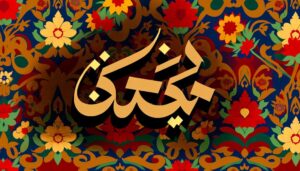Amir Name Meaning in Urdu
The name 'Amir' in Urdu signifies a leader or ruler, carrying connotations of authority, nobility, and cultural heritage. Originating from Arabic, 'Amir' combines elements of leadership and command, derived from the verb 'amara', meaning 'to command' or 'to order'.
It's a title historically bestowed upon leaders and nobles in Islamic cultures, reflecting the bearer's high status and responsibility. In Urdu-speaking societies, 'Amir' symbolizes leadership, respect, and dignity, connecting to Islamic and Mughal heritages.
If you're curious about the deeper cultural implications and modern usage of the name 'Amir', there's more to uncover.

Key Takeaways
- 'Amir' in Urdu signifies a leader, ruler, or commander.
- The name carries connotations of authority, power, and nobility.
- It reflects respect, dignity, and high status in Urdu-speaking societies.
- 'Amir' is deeply rooted in cultural, historical, and Islamic contexts.
- The name symbolizes leadership and a rich historical heritage.
Historical Origins of Amir
The name 'Amir' historically originates from Arabic culture, where it means 'prince' or 'commander.' This title was often bestowed upon leaders and nobles, symbolizing authority and nobility.
In Islamic history, many notable figures bore the name, reflecting their esteemed positions and responsibilities. You'll find that Amir not only held political significance but also carried spiritual and cultural weight. It was a title that commanded respect and indicated a person's role in maintaining order and governance.
As you explore further into its historical context, you'll see how the name Amir embodies leadership qualities and societal roles. This understanding helps you appreciate the rich heritage and the prestigious connotations associated with the name in various cultural narratives.
Linguistic Roots in Arabic
Drawing from its Arabic roots, 'Amir' combines the elements of leadership and command, encapsulating both authority and responsibility within its meaning.
In Arabic, 'Amir' (أمير) signifies a prince or commander, reflecting a position of power and governance. When you analyze the linguistic structure, you'll notice how 'Amir' is derived from the verb 'amara' (أمر), meaning 'to command' or 'to order'. This connection highlights the role of an 'Amir' as a leader who guides and directs.
Understanding these roots enriches your comprehension of the name's profound connotations.
- Authority: 'Amir' indicates someone with the power to make decisions.
- Responsibility: It implies a duty-bound individual who oversees and manages.
- Cultural Significance: The title is historically linked to rulers and leaders in Islamic and Arab traditions.
Meaning of Amir in Urdu
In Urdu, ‘Amir’ (امیر) carries the esteemed connotation of a leader or ruler, deeply rooted in cultural and historical contexts. You’ll find that the name signifies authority, power, and command, reflecting its historical usage among nobility and leadership. It’s important to understand how this name encapsulates respect and dignity in Urdu-speaking societies. In addition, the ‘Amira name meaning‘ is often sought after by parents looking for a name with a strong and authoritative significance for their daughters. It carries the same connotations of leadership and power as ‘Amir’ but is specifically associated with female leaders and rulers. This further emphasizes the respect and dignity attached to the name in Urdu-speaking societies.
Here's a concise breakdown:
| Aspect | Meaning | Contextual Significance |
|---|---|---|
| Literal | Leader or Ruler | Authority, Command |
| Cultural | Nobility, High Status | Historical Usage |
| Linguistic | Respect, Dignity | Urdu Connotation |
Understanding 'Amir' in Urdu enriches your grasp of its profound implications in social hierarchies and personal identity.
Cultural Significance in Urdu
You'll find that 'Amir' holds deep cultural significance in Urdu-speaking communities, symbolizing not just leadership but also a rich historical heritage. The name 'Amir' evokes images of influential leaders and has been a prominent title throughout Islamic history. Its cultural resonance is amplified in Urdu literature and poetry, where 'Amir' is often associated with nobility and governance.
In Urdu culture, the name 'Amir' is significant because:
- Historical Impact: It has been borne by many notable figures in history.
- Literary Presence: Frequently mentioned in classical Urdu poetry and prose.
- Cultural Identity: It symbolizes a connection to Islamic and Mughal heritages.
Understanding 'Amir' within this framework offers deeper insights into Urdu-speaking traditions and values.
Leadership Qualities of Amir
When you think of Amir, consider how his name embodies decision-making acumen and strategic prowess. He doesn't just lead; he inspires and motivates others, fostering a collaborative environment.
In Urdu culture, leading by example is paramount, and Amir exemplifies this through consistent actions and integrity.
Decision-Making and Strategy
Amir's leadership qualities are exemplified through his decisive and strategic mindset, reflecting a deep understanding of cultural nuances and effective decision-making. You can see how he navigates complex scenarios with a clear vision and practical solutions. His strategy isn't just about immediate gains but involves long-term planning and sustainability.
Amir's culturally attuned approach allows him to make informed decisions that resonate with his community, ensuring alignment and support.
- Analytical Approach: Amir evaluates data meticulously before making decisions.
- Cultural Sensitivity: He understands and respects traditional values, integrating them into strategic plans.
- Long-Term Vision: His strategies encompass future growth and stability, ensuring sustained success.
These attributes make Amir an exemplary leader in decision-making and strategy.
Inspiring and Motivating Others
Through his genuine passion and cultural awareness, Amir inspires and motivates others to achieve their fullest potential. You see how he leverages emotional intelligence to connect deeply with his team. He uses clear communication to align everyone towards a common objective. Amir's cultural sensitivity guarantees inclusivity, making everyone feel valued. Here's a breakdown of his key methods:
| Quality | Description | Impact |
|---|---|---|
| Emotional Intelligence | Understands and manages emotions | Builds trust and rapport |
| Clear Communication | Articulates vision and goals effectively | Enhances team alignment |
| Cultural Sensitivity | Respects and integrates diverse backgrounds | Promotes inclusivity |
| Enthusiasm | Shows passion and commitment | Energizes and motivates others |
This analytical approach reflects Amir's profound leadership qualities, propelling his team towards success.
Leading by Example
Leading by example, Amir consistently demonstrates the behaviors and attitudes he expects from his team. By embodying these leadership qualities, he fosters a culture of accountability and excellence. You can see his influence in various ways:
- Integrity: Amir always acts with honesty and transparency, ensuring his actions align with his words.
- Commitment: He shows unwavering dedication to his responsibilities, setting a high standard for others.
- Empathy: Amir listens actively and responds thoughtfully, valuing every team member's input.
In the context of Urdu culture, an Amir isn't just a leader by title but by action. His leadership style is rooted in mutual respect and ethical principles, encouraging a harmonious and productive environment. This analytical approach to leadership underscores the profound impact of leading by example.
Modern Usage and Popularity
In contemporary times, the name Amir has seen a significant rise in popularity, especially within Urdu-speaking communities. This surge can be attributed to its regal connotations, meaning 'prince' or 'leader,' which resonate with cultural values emphasizing nobility and leadership.
You're likely to encounter Amir in various spheres, including media, sports, and professional fields, highlighting its versatility and broad acceptance. Modern parents often choose Amir for its harmonious blend of tradition and contemporary appeal.
Additionally, the name's simplicity and ease of pronunciation make it accessible across different languages and cultures. Analyzing this trend reveals a preference for names that carry historical significance while fitting seamlessly into today's globalized world.
Conclusion
So, you've journeyed through the annals of history, navigated the labyrinth of Arabic roots, and discovered that 'Amir' in Urdu means, drumroll please, 'leader.'
With Amir's cultural significance, you'd think everyone named Amir would be ruling nations by now. But alas, modern usage has turned this grand title into just another name on a Starbucks cup.
So, next time you meet an Amir, remember, they're destined for greatness—or at least a grande latte.






